
WooCommerce vs Shopify: Pros, Cons, and Key Differences
Selecting the right e-commerce platform is a pivotal decision that can significantly impact your online business’s success. With numerous options available, the decision between deploying WooCommerce vs Shopify, two of the most popular choices, is something that most e-commerce marketers face at some point in their career. Each offers distinct features, advantages, and potential drawbacks.
In this comprehensive comparison based on my personal experience leveraging both platforms for Fractional CMO clients I have worked with, we’ll delve into the key aspects of both platforms, helping you make an informed decision tailored to your business needs.
I also want to offer you my personal opinion as a small business owner as to which platform I would recommend to similar small business owners or entrepreneurs. If you have endless resources or budget, you can make either one work well for you, but if you are short on budget, I feel there is a clear winner for even a basic plan.
Read on to learn which online store will likely work best for you!
Overview of WooCommerce and Shopify
Before we look into the basic plan and more advanced options for both, we need to take a look at the ins and outs of each platform. Many business owners do not boast a great deal of technical expertise in web design and website building, which can rapidly incur additional costs. Your eCommerce platforms should meet you where you are in your technical knowledge.
First up: WooCommerce.
WooCommerce
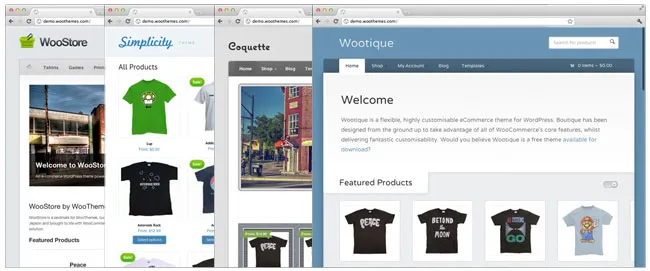
WooCommerce is an open-source WordPress plugin. It offers extensive customization for those with some technical knowledge regarding how websites work.
The WooCommerce plugin is an ideal option for businesses seeking flexibility and control over their online store, as it offers more control for the average ecommerce business.
One of the drawbacks of the WooCommerce plugin is its hosting requirements; hosting, domain registration, and maintenance must all be completed separate from the plugin itself, and may require additional plugins for maximized functionality.
Shopify
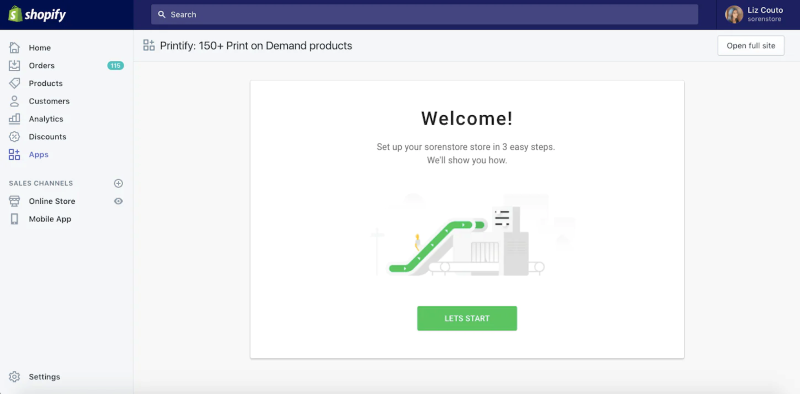
Shopify offers a fully hosted, all-in-one e-commerce solution, without the need for additional plugins or a wide range of technical skills.
Shopify is designed for ease of use, including minimal technical requirements for use, even in its advanced plan.
Shopify stores include hosting, security, and customer support in subscription plans, without the need to purchase additional features to download additional plugins. Shopify Plus offers even more for those who are not on a strict budget for their web hosting.
Further Reading: How Does Shopify Work? The Complete Beginner’s Guide
Pricing and Cost Considerations
Different platforms will assign different values to online transactions. Additional transaction fees can catch business owners unawares, as can unexpected pricing changes. I have put together detailed comparisons of the pricing and cost of WooCommerce and Shopify.
WooCommerce
WooCommerce is free to install. That being said, the need for additional plugins, premium themes, and hosting can all quickly cause costs to accrue.
Although there are additional costs involved, the benefit of WooCommerce remains: users receive greater flexibility in choosing preferred services and managing the expenses they incur each month.
Shopify
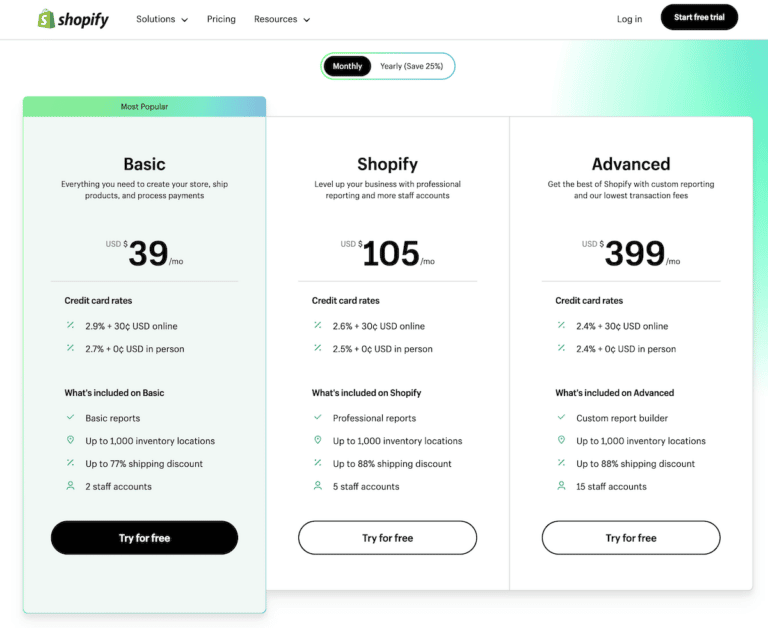
Shopify stores offer subscription-based pricing, with tiered plans, including Shopify Plus.
Premium themes and apps come at an additional cost, though the basics of inventory management and storefront creation are included in all plans.
Transaction fees can also be problematic, as these fees apply unless using the dedicated Shopify payment system.
Ease of Use and Setup
From Shopify ease of use to built-in WooCommerce Analytics, there are some stark differences between the ecommerce aps of WooCommerce and Shopify. Both offer functional ecommerce solutions, though they each have their own unique approaches to hosting environments, ease of use, and site setup.
Trying to Keep Up with Digital Marketing?
Just released: my new book to help small businesses, entrepreneurs, and marketers master digital marketing in today’s digital-first world.
Drawing on my Fractional CMO experience, Digital Threads simplifies complex strategies into clear, actionable steps for success.
Transform your business today—grab your copy! Click the cover or button below to buy on Amazon.
Further Reading: 15 Important Ecommerce Tools You Need to Know in 2025
WooCommerce
WooCommerce has a much steeper learning curve. It is best suited for users who are already familiar with WordPress and the content management systems set up on that site.
WooCommerce offers greater control over the customization and functionality of your site. From premium themes to more advanced features and plugins, WooCommerce offers far more in terms of functionality and customization.
Shopify
Shopify offers a user-friendly interface with a guided setup to prevent the struggle of contending with advanced features. It is, therefore, an ideal option for beginners or shop owners looking for a quick launch.
Shopify has additional features available in higher-tiered options, but still lacks the high customization of WooCommerce.
Design and Customization
Both platforms offer practical features, but design and customization are where the range of ecommerce platforms are truly set apart. WooCommerce is highly adaptable, while Shopify typically operates within specific, smaller parameters.
WooCommerce

If additional features are a significant concern, WooCommerce emerges as the clear winner. It offers extensive theme options and customization capabilities to help satisfy search engine algorithms.
WooCommerce also offers access to a truly massive library of plugins to improve functionality. From product listings to payment methods, WooCommerce has plenty of customization options.
Shopify
Shopify has professional themes, with limited customization options without some knowledge of coding.
The App Store offers various integrations to further enhance store features, including integration with social media platforms and ways to connect with different payment methods.
Further Reading: The 15 Best Shopify Themes (Free & Premium) for eCommerce Success in 2025
Performance and Scalability
The performance and scalability of each platform differs based on the infrastructure of the platform in question. Shopify, as a novice-ready platform, is prepared to scale, while WooCommerce is a flexible platform ideal for knowledgeable users or tech-savvy users. The performance and scalability of each can be defined as follows:
WooCommerce
Because hosting plans are not built in, the performance of your WooCommerce store will depend on your chosen hosting provider. Although hosting plans are generally built to withstand plenty of traffic, your hosting source can perform poorly.
WooCommerce sites are scalable, given that they are set up with the right infrastructure and optimization. The customization options unique to WooCommerce makes this a unique function, and ecommerce businesses must pay close attention to site set up as a result.
Shopify
Shopify is optimized for performance, with built-in scalability. Its eCommerce solutions are designed for growth from the beginning.
Shopify is a popular platform for a reason: it is able to handle traffic spikes and grow efficiently, cutting out the need for extra features to help manage changes to your audience or growth rate.
SEO and Marketing Tools
A wealth of users will focus on the site itself, but the ability of the platform to perform well in SEO is essential for growth and effective marketing. Inexperienced users may have a stronger preference for Shopify, as it has these tools built in, while more experienced users might prefer WooCommerce.
Further Reading: The Ultimate Guide to SEO for eCommerce Websites
WooCommerce
WooCommerce is the eCommerce solution that effectively leverages WordPress’ robust SEO capabilities. Yoast SEO is one such example, with built-in features to support high SEO scores for search engines and organic reach.
WooCommerce also provides access to a wide range of SEO plugins and tools. This may include plugins linking social media platforms and payment methods.
Shopify
Shopify offers built-in SEO features with additional apps available for users who are in search of further changes.
From product listings to landing pages, Shopify offers its users simplified SEO settings suitable for beginners. One of Shopify’s key features is its ease of use, with extra features available for those who are interested in going beyond the basics.
Payment Gateways and Transaction Fees
Whether you are looking for a one-off payment option, or you are looking for a way to prevent high transaction fees, you can find a platform to suit your needs. A highly customized site may offer more in the way of payment gateways than a narrower site.
WooCommerce
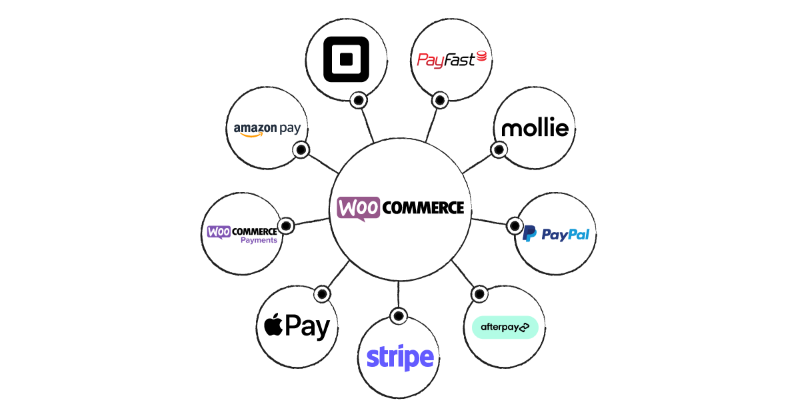
WooCommerce supports various payment gateways without charging additional fees. Its dedicated ecommerce platform offers as one of its key features numerous means of taking online payments.
WooCommerce is preferred by those looking for flexibility in choosing preferred payment solutions.
Shopify
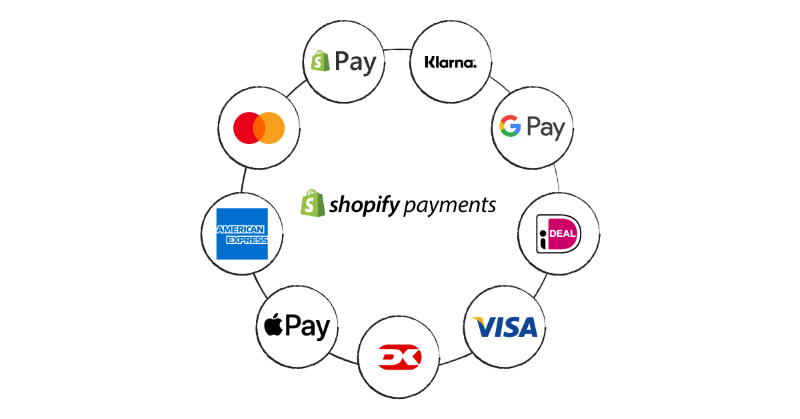
Shopify, as a dedicated ecommerce platform, offers multiple payment options, including Shopify Payments. The built-in feature of Shopify Payment eradicates any additional fees.
That being said, transaction fees do apply when clients make use of third-party gateways. This can be easily overcome when users adhere to standard Shopify payments.
Security and Support
A wealth of users are concerned about the security and support offered by their platforms. A community of users can offer support, as well as a dedicated customer service team. Security may also be offered as part of your platform’s basic plan.
WooCommerce
WooCommerce does not have a built-in security feature; instead it depends on the hosting provider and any measures that you implement as a business owner. While it is a popular platform, you should make sure that any self-hosted platform comes equipped with security features of some kind.
WooCommerce, as a WordPress feature, has plenty of community support with extensive levels of documentation to help search for answers.
Shopify
Shopify handles all security for its ecommerce sites, with key features including SSL and PCI compliance. This all-in-one approach to security on your site has made Shopify a popular platform to use as your dedicated ecommerce platform.
24/7 customer support is available for Shopify users, and is available through various channels.
Pros and Cons Summary
Ultimately, the question of WooCommerce vs Shopify is a complicated one. To determine which has more pros or more cons, remember to identify your own goals and needs. I have put together what I consider the most significant pros and cons of each, to help make your decision easier. Consider:
WooCommerce Pros
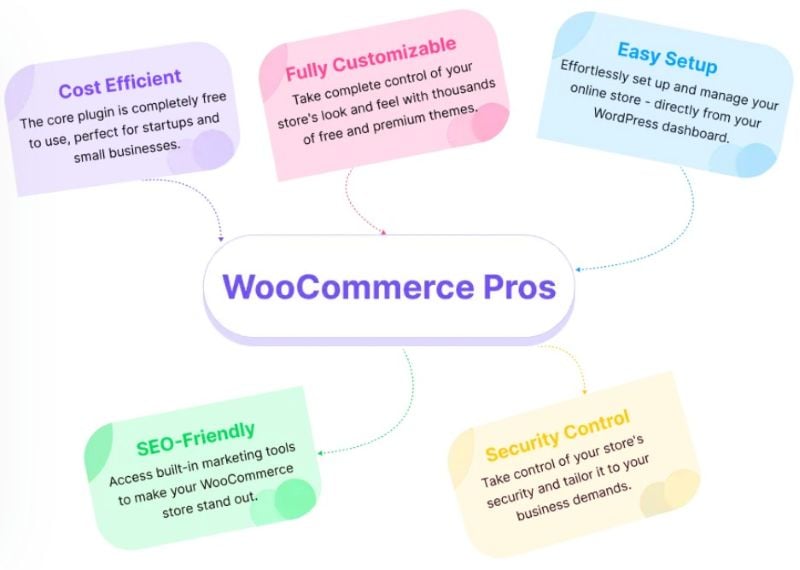
WooCommerce has many pros. Its high customization rate and flexibility make it an excellent option for anyone looking to open a store that is highly customized and unique. Its nature as a WordPress site also means it is likely to function well on Google Analytics, and perform well in search engine rankings.
WooCommerce is also a cost-effective option for those managing multiple sites. From security plugins, to discount codes, to landing pages, the ability to manage multiple sites can make WooCommerce the ideal tool to meet your needs.
Finally, WooCommerce is also known for its strong SEO capabilities. Search engine rankings can make or break a site, so making sure to appease Google Analytics can truly make a difference in your store’s success.
WooCommerce Cons
WooCommerce also has some cons. It requires technical knowledge to perform maintenance and manage the site. Custom code may be required to update your site periodically.
WooCommerce also requires additional costs to host and make use of premium features. It does not have its own native payment gateway the way that both basic and advanced Shopify sites do.
Shopify Pros
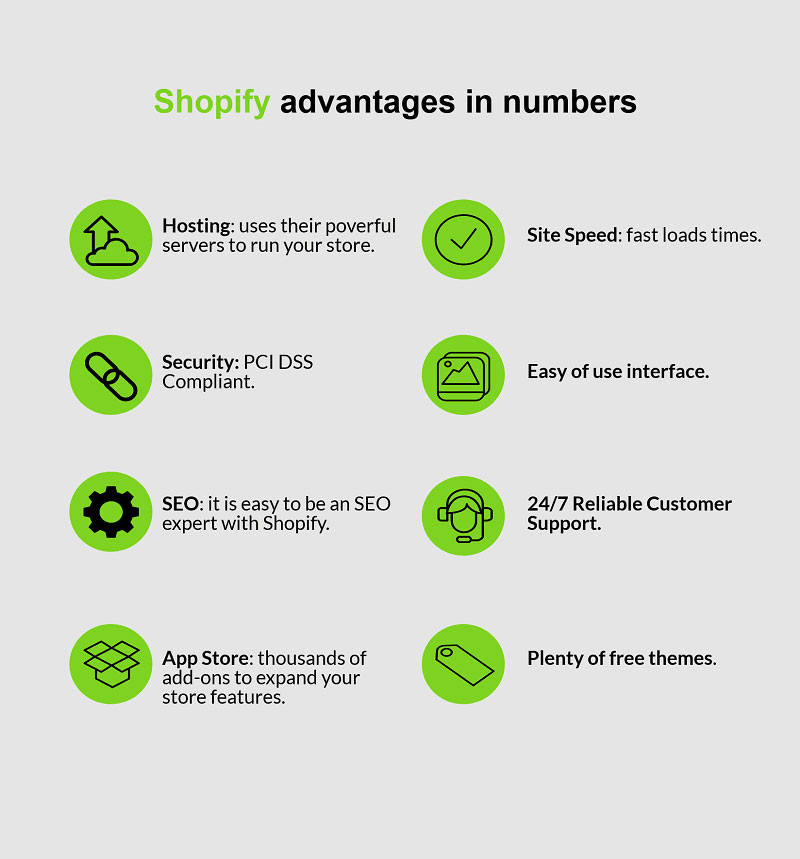
Shopify offers plenty of pros, perhaps the most significant being peace of mind; because Shopify is easy to use and sets up quickly, even its basic features can help improve conversion rates and support business success.
Shopify also offers comprehensive support and security. This means that you can enjoy peace of mind without having to find your own security service provider.
Finally, Shopify is built to be scalable. It boasts built-in features that allow users to continually improve conversion rates and grow, without interrupting service or compromising on quality.
Shopify Cons
The flexibility available with Shopify is limited; while the service provider does offer peace of mind in many arenas, it does so at the cost of customization, and focuses instead on basic features.
Shopify also operates according to subscriptions and transactions, which means contending with ongoing subscription and transaction fees.
Final Recommendations
Choose WooCommerce if:
- You desire full control over your store’s customization. WooCommerce offers significant customization options, so it is ideal for any customers who are looking for key features supporting customization.
- You’re comfortable managing technical aspects or have developer support. From online payments to security plugins, WooCommerce requires some knowledge of technical skills.
- You aim to leverage WordPress’s SEO strengths. If SEO is a concern, and you are looking to perform well in organic search, WooCommerce may be the better option to meet your needs.
Choose Shopify if:
- You prefer a hassle-free, all-in-one solution. Shopify has its own built-in security plugins, and higher-tier plans provide more features. Shopify can be used for both physical and digital products and virtually all product types can benefit from a Shopify site.
- You seek reliable support and built-in security. As previously discussed, Shopify comes equipped with security features, without having to resort to finding your own source of security.
- You want to focus on business growth without technical distractions. Having to manage your site can be a pain, especially for online store builders who are looking to maximize their growth potential.
Further Reading: 15 Best Ecommerce Website Builders to Set Up Your Web Shop
My Personal Recommendation: Shopify
From a time-to-market perspective, deep integration with the leading ecommerce email marketing platform Klaviyo, host of ready-to-use themes, apps, and ecosystem of developers, and it being the most popular ecommerce CMS (for these and other reasons noted above), I would wholeheartedly recommend Shopify to my small business clients, even if you are currently using WordPress to power your website.
Although WooCommerce is certainly an option for anyone using WordPress sites, online transactions are quickly and easily completed via Shopify, and numerous sites rely on its simple functionality to create their sites.
The Final Word on WooCommerce vs Shopify
My personal recommendation aside, deciding between WooCommerce and Shopify ultimately hinges on your specific business needs, technical expertise, and long-term goals. WooCommerce offers unparalleled flexibility and control, making it ideal for those who value customization and are comfortable with a hands-on approach.
Conversely, Shopify provides a streamlined, user-friendly experience, perfect for entrepreneurs seeking simplicity and comprehensive support. By carefully evaluating the features, costs, and capabilities outlined above, you can choose the platform that best aligns with your vision for e-commerce success.









